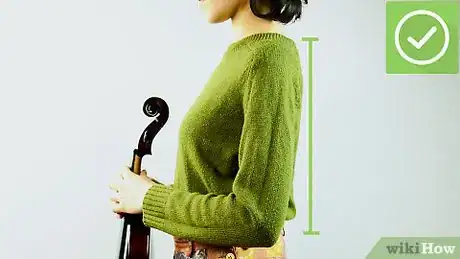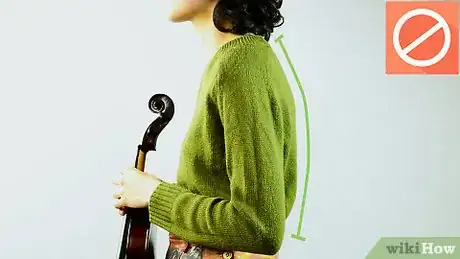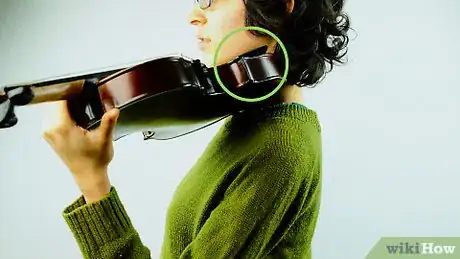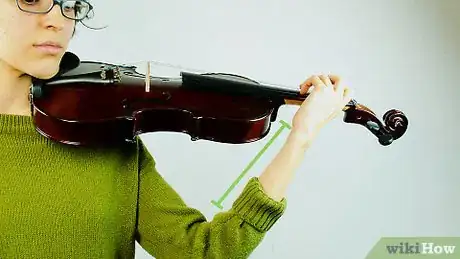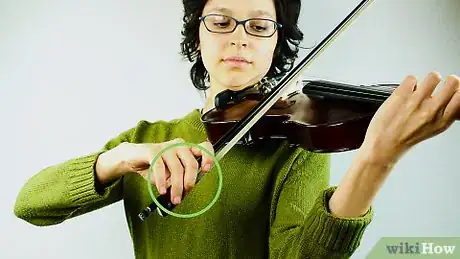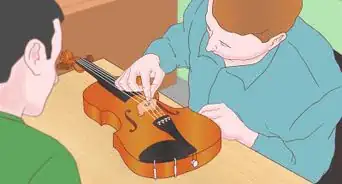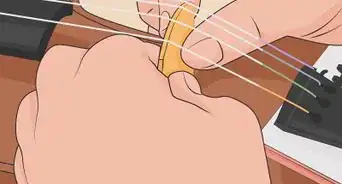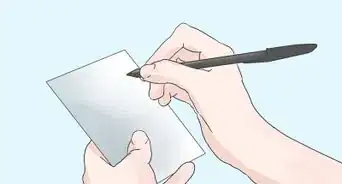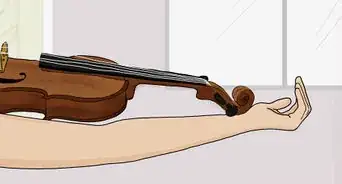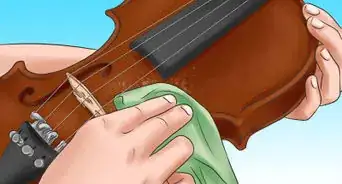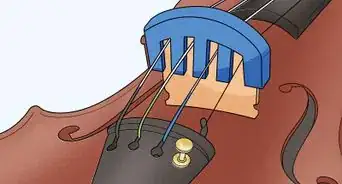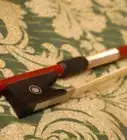This article was co-authored by Dalia Miguel. Dalia Miguel is a violinist and violin instructor based in the San Francisco Bay Area. She is studying Music Education and Violin Performance at San Jose State University and has been playing violin for over 15 years. Dalia teaches students of all ages and performs with a variety of symphonies and orchestras in the Bay Area.
wikiHow marks an article as reader-approved once it receives enough positive feedback. In this case, 93% of readers who voted found the article helpful, earning it our reader-approved status.
This article has been viewed 99,528 times.
Holding a violin incorrectly can stifle your sound and prevent you from being able to execute advanced techniques proficiently, keep you from advancing in your tone and speed and cause the violin to slip while playing. A violinist uses their hand, chin, jaw, collarbone and shoulder to keep the violin balanced and secure. Use these steps for positioning your violin.
Steps
Obtaining Correct Posture
-
1Sit down in a straight-backed chair or stand up straight. It doesn’t matter if you choose to sit or stand, but it does matter that you keep your core engaged [1] and that you sit up or stand up straight. You want to feel like you have power up through your body.
-
2Don’t slouch. Slouching can lead to decreased speed and eventual pain. When sitting, both feet should be flat on the ground with the same positioning as if you were standing.Advertisement
-
3Position your feet. If you're standing, position your feet a comfortable distance apart. They should be slightly less than shoulder-width apart, with your left foot a bit in front of the right. Place your weight fairly evenly between your two feet. When moving while playing, you may shift the weight between your feet. [2]
Positioning the Violin
-
1Place the violin on your neck and shoulder. You should rest the broad end of the violin onto your left collarbone with the neck of the violin facing outward. It should feel like a relatively natural, stable position.
-
2Place your chin on the chinrest. Lower you head straight down until it touches the chin rest. This may feel slightly less natural, but you also shouldn’t be straining yourself too dramatically. Your chin should only drop, not stretch.
-
3Angle your head properly. Now that your chin is on the chinrest, angle your head a little to the left so that you are looking 90 degrees from your violin. You want to angle your head in such a way that the chin rest runs along your jaw and ends at your chin.
-
4Pivot the violin toward the center. It should create a line that extends from your nose outward. [3] This is the correct way to hold a violin. If this is your first time holding a violin it might seem difficult, but get in the habit of doing it this way. Otherwise you will develop bad habits that will make it difficult to progress in the future.
Holding the Violin as You Play
-
1
-
2Hold the violin straight with the strings parallel to the ground. The violin has a tendency to drop with bad posture, so check your posture if you notice the violin dropping constantly. To help with this, tie a rope from the ceiling and attach it to the scroll of the violin. Make sure that the rope is short enough that it is taut when the violin is in the proper position. [6]
-
3Position your left hand at the end of the violin's neck, before the struts. Hold the neck between your left thumb and forefinger, as if you are pinching it. You don’t need to hold it too tightly or you will cramp your hand.
-
4Curl your forefinger onto the top of the neck. The remaining fingers should not touch the violin. The violin should rest on that knuckle lightly. The weight of the violin should be distributed evenly between this knuckle and your collarbone. [7]
-
5Establish a straight line from your left wrist to your forearm. Do not twist your wrist. This positioning will change depending on the type of music being played and which strings you are using. This is the basic 1st position.
-
6Grasp the bow. You need to hold the bow at the end of the bow. Don’t choke up on it like a baseball bat. Hold it with your right thumb and fingers. Your forefinger should rest on top of the bow's pad and your pinky finger should sit on a screw. Now you are ready to play. [8]
Expert Q&A
Did you know you can get expert answers for this article?
Unlock expert answers by supporting wikiHow
-
QuestionWhat is the proper way to hold a violin?
 Dalia MiguelDalia Miguel is a violinist and violin instructor based in the San Francisco Bay Area. She is studying Music Education and Violin Performance at San Jose State University and has been playing violin for over 15 years. Dalia teaches students of all ages and performs with a variety of symphonies and orchestras in the Bay Area.
Dalia MiguelDalia Miguel is a violinist and violin instructor based in the San Francisco Bay Area. She is studying Music Education and Violin Performance at San Jose State University and has been playing violin for over 15 years. Dalia teaches students of all ages and performs with a variety of symphonies and orchestras in the Bay Area.
Experienced Violin Instructor Make sure you have a good stance. Stand so that your feet are apart a little bit. Rest the violin on your shoulder, near your collarbone. Align the scroll of the instrument with your left foot. Stretch out your arm making sure that your arm is on the neck of the instrument and that your wrist is straight.
Make sure you have a good stance. Stand so that your feet are apart a little bit. Rest the violin on your shoulder, near your collarbone. Align the scroll of the instrument with your left foot. Stretch out your arm making sure that your arm is on the neck of the instrument and that your wrist is straight. -
QuestionWhy does it hurt when I put it up to my collarbone?
 Community AnswerDo you have a shoulder and chin rest? A lot of players use a shoulder rest to make the instrument softer on the collar bone.
Community AnswerDo you have a shoulder and chin rest? A lot of players use a shoulder rest to make the instrument softer on the collar bone. -
QuestionCan I use my right collarbone instead of my left if I'm right handed?
 Community AnswerMost string instruments are designed to have the bowing or strumming in the right hand and the fingering or fretting in the left. Although some are made so you can switch hand positions, it's best to use the standard position. This is especially helpful if something happens to your violin and you need to borrow another one.
Community AnswerMost string instruments are designed to have the bowing or strumming in the right hand and the fingering or fretting in the left. Although some are made so you can switch hand positions, it's best to use the standard position. This is especially helpful if something happens to your violin and you need to borrow another one.
References
- ↑ http://www.rkviolin.com/writ_fund_one.html
- ↑ http://www.rkviolin.com/writ_fund_one.html
- ↑ http://www.rkviolin.com/writ_fund_one.html
- ↑ http://www.rkviolin.com/writ_fund_one.html
- ↑ http://www.violinist.com/violin/how-to-hold-a-violin/
- ↑ http://www.violinist.com/violin/how-to-hold-a-violin/
- ↑ http://www.violinist.com/violin/how-to-hold-a-violin/
- ↑ http://www.rkviolin.com/writ_fund_one.html
About This Article
To hold a violin, start by placing the broad end onto your collarbone and shoulder with the neck of the violin facing outward. Next, lower your chin until it touches the chin rest, and then angle your head to the left so that you’re looking 90 degrees from the instrument. Finally, pivot the violin toward the center to create a line extending from your nose outward for the correct holding position. When you’re playing, keep the angle of the violin relatively steady so that the strings remain parallel to the ground. For more tips, including how to keep the correct posture, read on!
